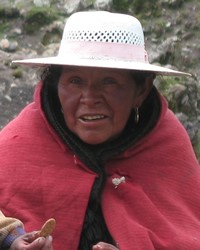Since the time of the colonization, Quechuas were either ignored (geographically difficult to access) or exploited as miners in Potosi or as peons on the haciendas of Spanish land lords. In Bolivia this situation didn't change until the revolution of 1952-1953 when the majority of the hacenderos (feudal land lords) were removed from power. Renowned for their tremendous work ethic, most Quechuas enjoy private land ownership as well as the right to move wherever they choose. Today's Quechua men and women are very politically active.
Traditionally an artisanal culture, the Quechuas have adapted to many aspects of modern technology, including widespread use of iron, diesel trucks, heavy equipment, plastics, imported fabrics, entertainment, and communications technology. Today's material culture is a blend of the old and new, with traditional forms of expression taking on new shapes through technological adaptation.
The modern Quechua-speaking woman clearly demonstrates this integration. There are two broad classes of Quechua ladies: the cholitas, whose traditional skirt, lacy top and long thick braids are today a sign of pride among the Quechua and the chotitas, who continue to speak in Quechua and maintain traditional practices but dress like the urban elite. Yet both groups of women love their cell phones, a factor that has served to homogenize and extend the use of the Quechua language.
Most South Bolivian Quichua speakers live in Bolivia, but there are also pockets of them in Argentina and Chile. An even small number are in the United States.
Quechuas traditionally value the past more than the future, as the past can be easily seen and understood, and the future is obscure. One practical manifestation of this cultural value is the tremendous burden of both respect and material aid that Quechuas place on their parents, often at the expense of their children. Another key to Quechua culture is the idea of the ayllu – a traditional extended family unit that provided structure to the community, the family, and a mutual defense against change. While most Quechuas are no longer part of a traditional ayllu unit, the ayllu value is today expressed through labor syndicates, neighborhood groups, and political action groups. Such beliefs are challenging to maintain in the United States, where Quechua men often go to work and are away from their families for extended periods.
Today, the majority would self-identify as Christian, which is a set of traditional Andean religious practices set in a Roman Catholic matrix. The Roman Catholic church lost a lot of power and prestige during the revolution of 1952 and as a result, many people either left Roman Catholic church in practice or entered one of the various evangelical church groups. As a result, there is a majority population in the evangelical church that accepts many traditional Andean religious practices without ever seeing that they might be anti-biblical.
Today, there is a great need expressed by evangelical church leaders for Bible training in their language. The Bible has been completely translated, but functional literacy is still relatively low in the Quechua language. So a two-pronged approach includes raising the comprehensive literacy of the leaders and, at the same time, deepening their understanding of the Bible. Discipleship in their language, while understanding the cultural context, is huge, and relationships take years to flower.
Pray for hundreds to be raised up with an unwavering faith in Christ, one that will not be shaken, no matter what comes their way.
Pray for God to bring about his purpose for the South Bolivian Quichua people.
Pray for Christians to have love, joy, peace, and patience as they tell others about the King of kings.
Pray for a mighty Holy Spirit revival to permeate their families and churches, drawing them into greater love for God and for their neighbors.
Scripture Prayers for the Quechua in United States.
Benjamin Kelm
| Profile Source: Joshua Project |











